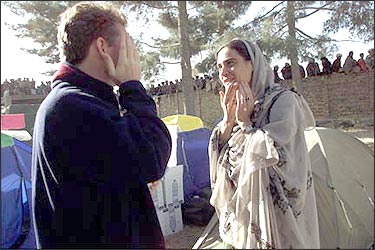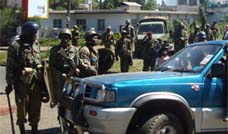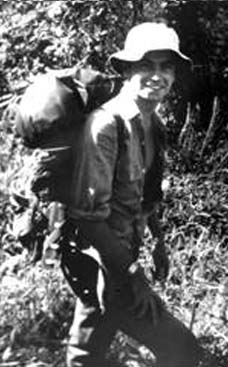
"This is what we do: Eleven Afghan men and women and I scour this harried land for its (licit) bounties and turn them into beauty products. Our soaps, colored with local vegetable dyes and hand-molded and smoothed till they look like lumps of marble, and our oils, elixirs for polishing the skin, sell in boutiques that cater to the pampered in New York, Montreal, and San Francisco. The scale of the effort—we sell about $2,500 worth of soap per month—is tiny. Still, our business, the Arghand Cooperative, represents what reports and think tanks say places like Afghanistan need: sustainable economic development. And it is almost entirely the product of private enthusiasm and generosity. From the institutional donors whose job I naively thought was to foster initiatives like ours, we have reaped much travail but almost no support. " Morocco RPCV Sarah Chayes has made a home in Kandahar, Afghanistan, became fluent in Pashto, one of the main Afghan languages, and devoted her energies to rebuilding a country gutted by two decades of war.
Sarah Chayes writes: Scents & Sensibility
Scents & Sensibility
[Excerpt]
You could take the man for a Talib, in his flowing Afghan garb, six or seven yards of black silk looped around his head, beard untrimmed, eyes now politely cast down as we spoke, now focused on his glass of tea, now off to his left somewhere—anywhere but looking at me, a barefaced woman who speaks to men directly in their language. The man was no Talib; he was my friend Kabir’s uncle, who cultivates black cumin on a highland plateau that lies across two ridges of bony rock north of Kandahar. What wafted in with him was not the distinctive astringent smell of cumin but the heady perfume of the flower we had asked him to gather, so we could distill its essential oil. It’s called Salvia spinosa, and it smells like ripe bananas doused in lime. How the unforgiving dust of southern Afghanistan produces such miracles remains one of the mysteries of the place for me.
I was trying to push 600 afghanis, or about $12, on Kabir’s uncle for the 30 pounds or so of flowers he had brought. It would have cost him half a day to comb the wheat fields, plus an hour and a half’s ride in a jolting open-backed truck to Kandahar. He delicately picked up the bills and placed them a little closer to me on the carpet where we sat. “I didn’t do this for money,” he protested. I cut him short, knowing the value of those bills to him. Three days’ wages for unskilled labor: men who stand in the bazaar in the morning, shovels across their shoulders. For Kabir’s uncle, a windfall he could calculate in rice, kilos of tea, meat for children. “If I came to your home hungry or had been wounded, you could tend me out of friendship,” I told him. “But this is business. Work should be recompensed.”
It took about half an hour, but I brought him round. He folded the money and tucked it away, then promised to plant Salvia spinosa for us next year. It grows wild in the upland fields; crones grind up the shiny seeds and use them in poultices for eye irritations, but no Afghan farmer would think to cultivate the stuff, for up till now there has been no market for it.
This is what we do: Eleven Afghan men and women and I scour this harried land for its (licit) bounties and turn them into beauty products. Our soaps, colored with local vegetable dyes and hand-molded and smoothed till they look like lumps of marble, and our oils, elixirs for polishing the skin, sell in boutiques that cater to the pampered in New York, Montreal, and San Francisco.
The scale of the effort—we sell about $2,500 worth of soap per month—is tiny. Still, our business, the Arghand Cooperative, represents what reports and think tanks say places like Afghanistan need: sustainable economic development. And it is almost entirely the product of private enthusiasm and generosity. From the institutional donors whose job I naively thought was to foster initiatives like ours, we have reaped much travail but almost no support.
Read the rest of this article at The Atlantic.









